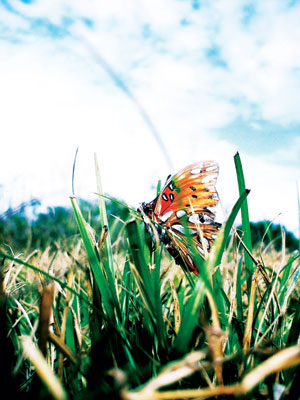All Nonfiction
- Bullying
- Books
- Academic
- Author Interviews
- Celebrity interviews
- College Articles
- College Essays
- Educator of the Year
- Heroes
- Interviews
- Memoir
- Personal Experience
- Sports
- Travel & Culture
All Opinions
- Bullying
- Current Events / Politics
- Discrimination
- Drugs / Alcohol / Smoking
- Entertainment / Celebrities
- Environment
- Love / Relationships
- Movies / Music / TV
- Pop Culture / Trends
- School / College
- Social Issues / Civics
- Spirituality / Religion
- Sports / Hobbies
All Hot Topics
- Bullying
- Community Service
- Environment
- Health
- Letters to the Editor
- Pride & Prejudice
- What Matters
- Back
Summer Guide
- Program Links
- Program Reviews
- Back
College Guide
- College Links
- College Reviews
- College Essays
- College Articles
- Back
Five Degrees
Stepping out onto the dry, crunching vegetation, the hum of bugs filled the air. We had arrived at planet 34278 in between their Sun and Moon cycle, and the dying sunlight cast a familiar-colored glow across the less familiar land. Back at our own planet this in-between period lasted weeks and was often considered an inconvenience. The intelligent species here loved it, however, revelling in its impermanence and often performing some sort of commitment rituals during this passing. How they revelled in everything impermanent, making cultures out of it, yet seeming to forget they were impermanent themselves.
I had never really liked them much. As a species they were so complex, yet so weak alone. It was their pack bonding, our species had decided, that let them live in the odd and harsh climates of their planet. We had observed them over the years, watching them trip over their own feet. A species as weak as them would surely die out soon, we all said.
But they grew stronger. They began to create things, combining earthly elements to make things not naturally occuring. They evolved at such a quick rate that it felt as though we could blink and miss eons of progress and advancements.
Then they became violent. They had always been, like any predator would be. They had to fight predators and kill prey to survive - that was the one universal truth. But they didn’t stop there. They began to fight over land, power, all matters of things that would make no difference to the universe. Our species watched them with anticipating eyes, though what we were anticipating, I do not know. Their anger and aggression, their ability to kill without questioning - it terrified us. We knew that if - when - they would learn to navigate beyond their planet, if they should find us, we would stand no chance. But it also gave us some sort of hope. That, if they could simply spend all of their time fighting and less of their time expanding and revising their technology, that we might just be spared.
I glanced over the land. Bulky machines stood still on rectangular strips of rock. The entrances to all matters of dens were blocked by boards of tree. This planet had given this species lands of ice so cold that those who went into there often didn’t make it out alive, lands full or scorching sediment that could burn them to ash in less than a quarter of their planet’s rotation, lands full of other creatures that could tear them apart from the inside or outside first; whichever way it happened didn’t matter to the beasts. This species had lived through disease, famine, and war time and time again, and when they couldn’t adapt to their planet, they made their planet adapt to them.
Yet, with everything this species - humans - faced, they were their own demise. They were granted a planet of gratuitous resources and forced it to bow to their will. Their machines produced the gases of the atmosphere, more than their planet could handle, and it kept the heat of their Sun trapped up close against them. And it suffocated them. Their bountiful food gave way to famine, their water became undrinkable, and the silence of their suffering was eventually overcome by the silence of their death. We wondered what difference had been made. What titan of change, what monumental revision had brought down this species that had until now demanded that nature itself bow to it? It was a question we should not have answered, for the answer sent a cold shiver down our spines.
Five degrees.

Similar Articles
JOIN THE DISCUSSION
This article has 0 comments.
